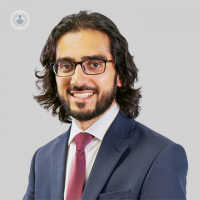What are lipid disorders, and how can they be managed?
Written in association with:In one of our latest medical articles here, renowned consultant cardiologist, Professor Riyaz Patel, explains what lipid disorders are, whilst also telling us how exactly these disorders can affect us.

What are lipid disorders?
Lipid disorders encompass a spectrum of conditions marked by irregular lipid (fat) levels in the bloodstream, including cholesterol and triglycerides. While lipids are indispensable for various bodily functions, deviations from normal levels can lead to grave health ramifications.
An unhealthy lifestyle constitutes a principal cause of lipid disorders, characterised by a diet high in saturated and trans fats, alongside cholesterol, coupled with physical inactivity. Genetic predisposition also exerts a substantial influence on individuals' susceptibility to dyslipidemia. Concurrently, underlying medical conditions such as diabetes, hypothyroidism, and kidney disorders can exacerbate lipid irregularities.
How can lipid disorders affect our general health?
The repercussions of lipid disorders are extensive and deleterious to health. Elevated levels of low-density lipoprotein (LDL) cholesterol, colloquially labelled "bad" cholesterol, foster arterial plaque accumulation, heightening the likelihood of atherosclerosis, heart attack, and stroke. Concurrently, heightened triglyceride levels correlate with pancreatitis and accentuate cardiovascular risk when paired with elevated LDL cholesterol.
How can they be managed?
Managing lipid disorders entails lifestyle alterations and, at times, pharmaceutical intervention. Adopting a heart-friendly diet low in saturated and trans fats, combined with regular physical activity, serves as a cornerstone for regulating lipid levels. Integration of omega-3 fatty acid-rich foods such as oily fish, nuts, and seeds can aid in ameliorating lipid profiles. Additionally, weight management endeavours and cessation of smoking are indispensable facets of lifestyle modifications.
In conjunction with lifestyle adaptations, medications may be prescribed to effectively manage lipid disorders. Statins are frequently recommended to curtail LDL cholesterol levels by impeding its hepatic production. Supplementary medications, including fibrates, niacin, and bile acid sequestrants, may be employed either individually or in tandem with statins to target specific lipid abnormalities.
Routine monitoring of lipid levels through blood assays is imperative for gauging treatment efficacy and making requisite adjustments. Healthcare providers play a pivotal role in enlightening patients about lipid disorders, empowering them to take charge of their well-being via lifestyle tweaks and adherence to medication regimens.
To book an appointment today with Professor Riyaz Patel, simply visit his Top Doctors profile.


